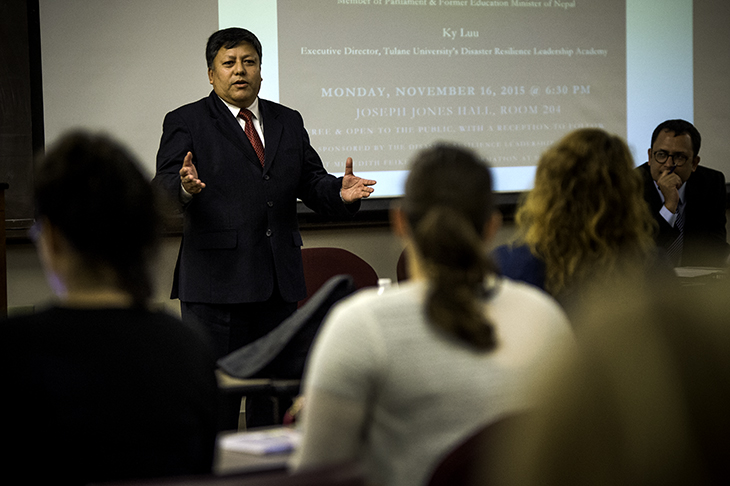Managing the disaster of the Nepal earthquake

Gangalal Tuladhar, former education minister of Nepal, speaks to students who are studying resilience with the Disaster Resilience Leadership Academy at Tulane University on Monday (Nov. 16). (Photo by Ryan Rivet)
Seven months ago, Gangalal Tuladhar was sitting down to lunch with his extended family in Nepal when his house began to shake. The shaking was the result of an earthquake"s tremors that would soon claim the lives of more than 9,000 people and injure thousands more.
Tuladhar, a parliamentarian and former education minister of Nepal, recounted his experience of the earthquake to a group of Tulane University students and members of the community on Monday (Nov. 16) as a part of Forum Tulane"s lecture series on resilience. The talk was sponsored by the Disaster Resilience Leadership Academy (DRLA) at Tulane University.
Disaster and risk management scholar Komal Aryal and Ky Luu, executive director of the DRLA, joined Tuladhar to discuss disaster management in the context of the Nepal earthquake.
“We can take disasters as an opportunity to make the future better,” said Tuladhar as he reflected on what was, in his opinion, a weak disaster response from the Nepalese government. “We need to bring the academics and the researchers to the risk-reduction policymakers, because their conclusions should be incorporated into the policymaking strategies.”
Aryal agreed, emphasizing that it is crucial for a community"s leadership to have an understanding of disaster management in order to manage a crisis efficiently and effectively.
Nepalese government officials will partner with the DRLA this year to train the country"s leadership in disaster resilience and humanitarian assistance. This partnership is part of the second phase of the DRLA"s Disaster Resilience Leadership Program, which recently received a $3.5 million grant from the Bill & Melinda Gates Foundation to expand its reach to more communities.
“Our mission is to promote leadership development in order to promote resilient outcomes,” said Luu. “We can learn as much from our colleagues in Nepal, as they can from us.”
Samah Ahmed is a sophomore majoring in public health and political science at Tulane University.
